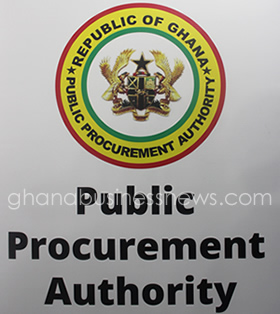Ghana saves GH¢98m through enhanced procurement and supply practices
 Ghana has made savings to the tune of GH¢98 million over the past nine months through the introduction of stringent measures by the Public Procurement Authority (PPA) to address waste in the procurement and supply management sector.
Ghana has made savings to the tune of GH¢98 million over the past nine months through the introduction of stringent measures by the Public Procurement Authority (PPA) to address waste in the procurement and supply management sector.
Mr Agyenim Boateng Adjei, the Chief Executive of the Public Procurement Authority, said the amount, otherwise would have been eroded through padded contracts sum and other procurement malpractices.
Mr Adjei, who made this known at the launch of the Ghana Institute of Procurement and Supply’s (GIPS) Code of Ethics for procurement and supply professionals in Accra on Tuesday, commended the institution for the effort aimed at addressing some of the ethical challenges of the profession.
He mentioned some of the malpractices as bid and tender rigging, where there was collusion among tenderers; Bid and tender suppression, where competitors were coerced to agree not to participate; complementary bidding and tendering, where competitors submitted broken tenders to favour one of them; and Low Balling, which involved the submission of low bid and tender anticipation of losses being mitigated by variations.
He said the prevailing narrative of non-compliance and corruption in the practice continued to dent the image of the procurement profession.
“It is even more disheartening to realise that, procurement professionals who are supposed to guide our political leaders to save the public purse, end up conniving with them and sometimes misconducting themselves under the guise of fear of threats of demotion, loss of jobs or relegation to the background in their institutions,” he said.
Mr Adjei said this must no longer be entertained, and that persons found culpable of misconducting themselves in their line of duty would be made to face sanctions as spelt out in the GIPS Code of Ethics and Conduct in addition to any other legal and disciplinary actions as permitted under the law.
He urged procurement professionals to be bold and assertive in pointing out wrongful acts and respectfully submit their professional stance to their bosses when the need arises.
“This therefore calls for a united front which GIPS is prepared to provide for all procurement professionals and practitioners through its Code of Ethics and Conduct”.
He said procurement in recent times become a key economic and political activity of governments all over the world, and no more a simple act of purchasing, but rather, a development tool that had the ability to transform public finance into developmental outcomes.
“It has become an essential element in governance that our political leaders must deploy with tact and skill in order to execute their practices and accomplish the desired benefits for their citizens,” he said.
He said to this end, the new PPA, under his leadership has established two purpose-driven operational units made up of the Due Diligence and Value for Money, and the Procurement Audit Units respectively, to enhance the credibility of the Authority’s operations and processes.
The Due Diligence and Value for Money Unit, he said has been created with clear terms of reference to determine the reasonableness or otherwise of jurisdictions provided by Entities in their applications for Sole Source and Restricted Tendering as they related to the appropriate provisions of the Procurement Act 663 as amended.
Mr Adjei said this was to restore public confidence and credibility in the Sole Sourcing and Restricted Tendering approval as well as provide technical advice on government contracts to obtain value for money.
The Procurement Audit Unit on the other hand, he said, was responsible for the conduct of periodic audits, investigations and performance assessment exercises to assess the level of compliance or otherwise of procuring entities in respect to the law, and share its findings with the law enforcement agencies such as the Economic and Organised Crime Office (EOCO) to prosecute offenders.
He said considering the enormous rule that public procurement played in the socio-economic growth of countries, it was instructive that the profession be given due recognition, to enable it to play its strategic role through value addition and risk mitigation that would impact positively on the economy.
He encouraged all procurement professionals and practitioners to be guided by the provisions of the Code of Ethics, and conduct their activities in a transparent, judicious and non-discriminatory manner to achieve value for money.
Mr Collins Agyeman Sarpong, the President of the Ghana Institute of Procurement and Supply, called for the urgent formulation of a legislation backing to the practice, to minimise corruption, and weed out persons who saw procurement and supply as an avenue to selfishly enrich themselves.
Source: GNA
